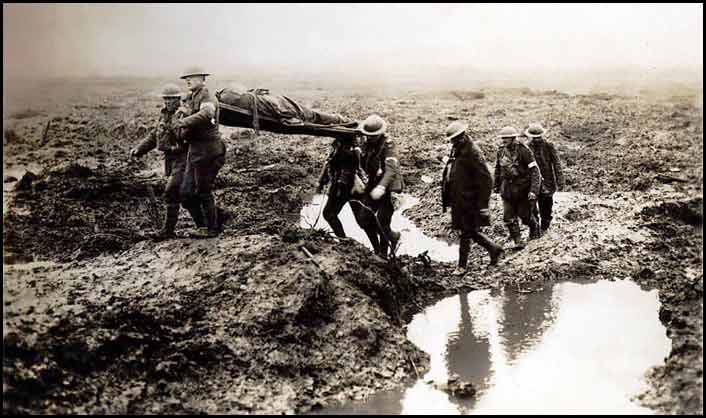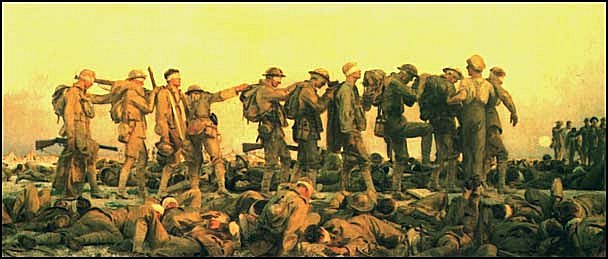I first heard of World War I when we came to America as Displaced Persons in 1951. We were refugees after World War II, and we moved into a basement apartment on Hamilton Street in Chicago.

Our landlord was a veteran of the First World War. He was a Polish American named Ponchek. He was also a drunk, but that wasn't anything special. There were a lot of drunks around. What made Ponchek special was that he had a steel plate in his head. As a kid and a recent immigrant to America, he had been drafted and sent to France to stop the Germans who were trying to rip France apart and shove it into the Atlantic. He ended up in the trenches in France in late October fighting the Germans, and a bullet took off the top of his head. The doctors cut away what bone they could, cleaned out the wound, and screwed a steel plate into the skull bone.
This fascinated me when I was a kid. I wondered about that plate, and what it felt like. Did Ponchek always feel a weight pressing down on his head? Was it like wearing a steel hat? A steel helmet? And I wondered what they covered the plate with. Skin? And where did it come from? Was it his skin or someone else's? I never could ask.
Like a lot of the veterans I knew, he was frightening. He wasn't a guy you wanted to spend a lot of time talking to.
Veterans were men who limped. They dragged their legs behind them like Lon Chaney in the Mummy movie. They were men who had wooden legs that creaked when they walked past you and the other kids sitting on the stoop. These veterans had no arms or only one arm, or were missing fingers or hands, or ears.
My dad, a guy who lost his left eye when he was clubbed by a Nazi guard in a concentration camp, used to go to a bar where the owner had a black, shiny rubber hand. He lost his real hand during the Warsaw Uprising in 1944 when he shoved a homemade grenade into the steel treads of a German tank. The black rubber hand was like some kind of weird toy. Sometimes, it looked like a black fist, sometimes it looked like an eight ball.
Sometimes, a vet without arms or legs sat on the sidewalk in front of this bar. He had a cloth hat in front of him, and he was selling pencils. He'd sit there smiling, making chit chat with the guys walking in and out of the bar. You'd toss him a nickel, and you could take a pencil, but most guys didn't. Who needs a pencil?
Veterans were frightening. Some of them beat their kids and got drunk and had trouble getting through the day. They had trouble getting through the night too. There were these two little girls who lived two doors away, Patty and Cathy. Their dad was a Korean War veteran, and he would come home from his job at about midnight. The kids and their mom had to be out of their basement apartment then. He would beat and curse all of them if they weren't. They'd have to walk around the neighborhood until he was safely in bed, asleep. This veteran didn't like to fall asleep with people in the house. Everyone knew he was crazy.
Ponchek was a veteran too, and -- like I said -- he was a drunk and a man with a steel plate in his head. One time he and his two buddies got so drunk that they all came down to our basement apartment and tried to force my mother into giving them money for whiskey. There she was alone in a house with her two little kids, and this drunk and his two drunk buddies came around trying to take money from her. They told her that she hadn't paid the rent, and that if she didn't paid them, they would throw her out on the street. What kind of guys would do that? She pushed Poncheck down and kicked him, and took a broom and beat him and his friends as they tried to get away from her. My mom was a veteran too; she spent two and a half years in a Nazi slave labor camp.
Three or four years later, my mom and dad and my sister and me visited Ponchek in the big Veterans Administration hospital on the south side of Chicago. We didn't have a car, and so we had to take buses, and it seemed like it took forever to get to the hospital. This must have been about 1956 or 1957. The hospital was full of veterans, men from World War I and World War II and the Korean War. Ponchek was dying from some kind of stomach cancer, and he was in a lot of pain. We came to say goodbye to him. We found him in a bed in the corridor because there were no available rooms.
He was happy to see us. My parents had brought him some cigarettes, and my dad gave him one, and lit it for him. My sister and I stood there watching my mom and dad and Ponchek smoke and talk. They talked about those days on Hamilton, and the good times they had.
They didn't mention his steel plate and his drinking and his craziness.
 PS: Before I sign off, let me say something about Veterans Day.
PS: Before I sign off, let me say something about Veterans Day.
It grows out of Armistice Day, the day the carnage of World War I ended. It ended on the 11th hour of the 11 th day of the 11th month.
Here's a poem by John McCrae called "In Flanders Field." He was a doctor who wrote the poem in 1915 for a friend who died in the Battle for Flanders Field. The battle lasted 100 days and cost 400,000 Allied and German casualties. The war went on for another 3 years after that, and millions of people died in those years.
Here's McCrae's poem:
In Flanders fields the poppies blow
Between the crosses, row on row,
That mark our place; and in the sky
The larks, still bravely singing, fly
Scarce heard amid the guns below.
We are the Dead. Short days ago
We lived, felt dawn, saw sunset glow,
Loved, and were loved, and now we lie
In Flanders fields.
Take up our quarrel with the foe:
To you from failing hands we throw
The torch; be yours to hold it high.
If ye break faith with us who die
We shall not sleep, though poppies grow
In Flanders fields.

When I told my daughter Lillian that I was going to use the Flanders Field poem, she suggested another poem.
Here's what Lillian wrote:
"Personally, I like the Ode of Remembrance (the 3rd and 4th stanzas of Binyon's "For the Fallen") that they use throughout the "British Empire" at Remembrance Day commemorations. I think Binyon's poem, at least the following two stanzas, is more universal. It could be any war, any century, any side; and I think that is what Remembrance Day is for, remembering every fallen soldier--every kid who is too naive or too idealistic or too stupid or too gullible and so they join up for all of the right and all of the wrong reasons and then they die, painfully and horribly and wastefully, but bravely and nobly."
And here's Binyon's poem:
They went with songs to the battle, they were young,
Straight of limb, true of eye, steady and aglow.
They were staunch to the end against odds uncounted,
They fell with their faces to the foe.
They shall grow not old, as we that are left grow old;
Age shall not weary them, nor the years condemn.
At the going down of the sun and in the morning
We will remember them.
PPS: Let me say just one more thing:
War comes to us, and we weep at our losses and pray for our delivery. And then peace comes and then peace goes, and wars come and come and come.





